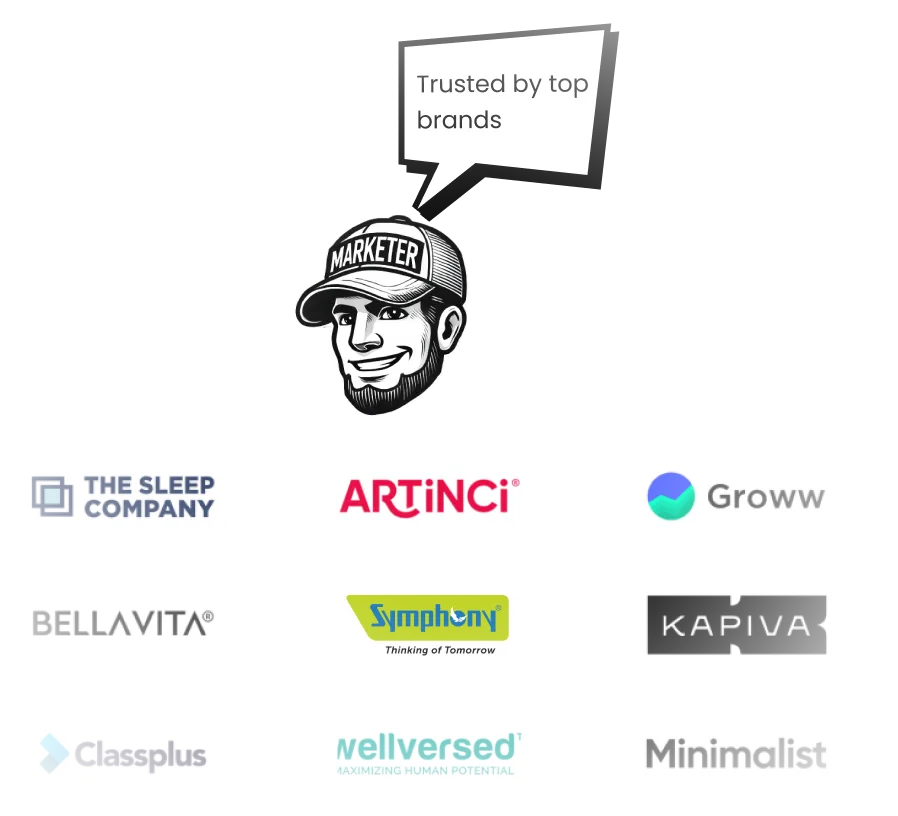Carving a Niche in Growth Marketing is all About Maintaining Consistency


Carving a niche in growth marketing is all about maintaining consistency
Highlights of the talk
- Highs and lows of a freelance growth strategist's career
- Setting realistic goals in growth hacking
- Impact of website personalization on conversions
Take us through your journey in the marketing space.
I started marketing while I was working for a PR company. I used to take part in their brainstorming sessions and that was like my conception of my marketing journey.
So after that, I also used to sell products and so I got to discover that I sort of understood how people react to certain things, got a hang of human behavior in relation to selling products. So I sort of knew that I had a talent in marketing and that was really what engineered me to focus in marketing and grow. I have a bachelor's of science in economics, so I actually decided to pursue marketing and as a career.
What is the best part of a marketer's job for you?
The best part of a marketer’s job is trying to see that people are reacting positively to a narrative that you're trying to sell without forcing it on people. So it's just like you're trying to sell a product and you have an idea of the type of people that need such products, the problems that they are going through and you come up with a plan to target this set of people and you actually see those people reacting to your plan. I feel like that's a high point for every marketer.
What are the challenges and the advantages of being a freelance marketer?
I'm still quite young in the freelance market, so the inflow of jobs is a problem. The part of the world I’m in also impedes my growth. Additionally, working as a freelancer, one important problem is managing the work processes. You might feel it's easier because you have the freedom to like to work on projects according to your own schedule on your own time.
But then you get to a point where you can be overwhelmed. And if you don't know how to manage your work processes properly and how to manage your time, you might have a lot to do and end up doing nothing.
You have worked extensively in the growth hacking field. What, according to you, is essential for an effective growth strategy?
Firstly, what is essential is being realistic with the situation of the company and what works for the company and not just trying to apply different growth strategies that you're trying to experiment. Basically, if you know that this business thrives on LinkedIn, your focus should be like most of the people that you target in on LinkedIn and effective growth strategists would advise that you double down on that chat and you have a work process in place where you are generating enough leads and you are making enough profit from that from that channel.
Then you can explore other channels where you have already done your research and you feel like there is not so much meat here, but then we can create markets in this channel. So that's really easy for me because growth is like a set of experiments that you test a little before it leads to a bigger perspective of growth. If you've tested this channel, you see that it's working, it's only wise to double down on the channel that's working properly and make sure you are getting enough from those channels before exploring other channels.
What do you think marketers are getting it wrong because of which they lose conversions, especially with respect to website conversions?
I feel like it has to do a lot with customer journey and the type of users that are coming on the website. So basically what is on your website? Is it actually speaking to the person that's visiting your website and what stage of the consumer or user journey is that user visiting your website? What prompted the person to get to your website? Having the right message in front of the person for every category of user that's coming to the website, definitely boosts conversations.
It really boils down to the user. If businesses and companies can take into consideration the category of users that visit their website and make sure that you're communicating effectively to them, that's like the best way to win over a customer. Like if I'm speaking your language, you definitely will listen to me.
How crucial do you think is website personalization for marketers?
That's like I go customizing websites for users. I feel like it's a hundred percent crucial cause, there shouldn't be a website if you are not trying to communicate to users. I mean you have a website because of insights from authority and I'm trying to brand your company. It is mainly for your users to use as a channel. So I feel it's crucial to have website personalization in place.
What are the most interesting marketing campaigns that you have been a part of?
The most interesting thing I've worked on was while I was at an agency and we worked on a development project. We had to drive conversation using a hashtag, using a disruptive method.
Coming to content and copywriting, what is your mantra for creating a killer copy?
Basically, you should be able to connect to your audience's emotions. Once you connect, you tell a story that connects to the needs and the emotions of the person you are trying to sell.
So you don't necessarily need to sell. You're just creating a scenario where the person responds to the message and that automatically works. So once you can connect to the needs and emotions, people and you win them over.
What is your process of researching customer profiles?
I need to know the awareness stage of the customers. I understand the problems they are facing and associate it with the solutions we have and this information forms the basis and then I come up with copy or content.
What kind of training and educational resources would you recommend to an entry level marketer?
Self-confidence is the first thing you have to give yourself as a marketer. Another thing is being consistent because you don't get the results. As soon as you start being consistent, you will form a good foundation. For example, Google has a lot of free courses. Learning is very good but you actually have to learn by doing and by surrounding yourself with the greatest minds in marketing. If you’re trying to grow yourself in the copywriting industry, connect with hundreds and thousands of copywriters on LinkedIn. So you have your timeline populated with content from the industry.
You'll be seeing people who have years and years of experience of dropping their insights. Just being in the ecosystem and feeding yourself every day without actually being in a traditional learning center or doing a certificate course, interacting or sending DMs to people, asking questions and actually being curious to get better at what you do is a great way to learn.
What has played an important role in your success as a marketer?
I believe it’s about being consistent. The frequency to keep on going and keep on doing what you feel is right and not attaching emotions to your personal growth is what I feel like has contributed to my personal success.






.svg)


.avif)